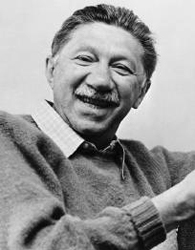Best known for his theory of self-actualization, psychologist and philosopher Abraham Maslow identified a “Hierarchy of Human Needs,” noting that once basic needs were met, a could person seek out higher-level needs such as self-esteem.
Abraham Maslow’s Early Days
Abraham Harold Maslow was born on April 1, 1908, in Brooklyn, New York. He was the first of seven children born to Russian immigrant parents. Although his parents wished to see him become a lawyer, Abraham Maslow only studied law for a few semesters at the City College of New York. He then delivered a shock to his parents by marrying his cousin Bertha Goodman; the two later moved so that Maslow could attend the University of Wisconsin and study psychology.
Maslow received a B.A. and M.A. from the University of Wisconsin. After graduating he worked at Columbia University and got a teaching job at Brooklyn College. In 1951 Maslow joined the faculty of Brandeis University as head of the department of psychology.
Sources in this Story
- Muskingum University History of Psychology Archives: Abraham Maslow
- The Economist: Management guru: Abraham Maslow
- BrandeisNOW: Margie Lachman on the legacy of psychologist Abraham Maslow
- Association for Humanistic Psychology: Humanistic Psychology Overview
- ALLPSYCH: Abraham Maslow
- The Economist: Management Idea: Hierarchy of Needs
Notable Accomplishments
One of the key differences in Maslow’s way of thinking was that his theories were “based in normal behaviour, rather than on aberrations and mental sickness.” Maslow had done research on the Blackfoot Indians in Alberta, Canada, and found that the range of personalities there was nearly the same as the personalities he had observed in his own society.
Maslow felt that people were inherently good, and that the things that motivated action were the needs of a person. He also observed that people could grow and change throughout their lives.
Maslow was key in the conception of humanistic psychology, known to some as the “Third Force.” Until the 1950s, psychology in America mostly consisted of behaviorism (the First Force) and psychoanalysis (the “Second Force”). Pavlov’s work in behaviorism focused on conditional reflexes, whereas the work of Freud and others in psychoanalysis focused on the unconscious mind.
In the late 1950s Abraham Maslow and Clark Moustakas held meetings with other psychologists to try to put together a school of psychological thought that would consider those things that were uniquely human: self, love, creativity, being, etc. Brandeis University helped formally establish the American Association for Humanistic Psychology in 1961.
Maslow later developed a Hierarchy of Needs. He found that people needed to have basic needs (such as food and water) satisfied before being able to pursue higher-level needs (such as social interaction, self-esteem and even self-actualization). Maslow’s hierarch is divided into five segments; physiological needs, safety needs, belonging and love needs, esteem needs, and the need for self-actualization.
According to Maslow, the ultimate goal of any person is to reach self-actualization, however no one ever can actually achieve beyond self-actualization because that level of need is an ongoing process (creating art, making music, writing or whatever other pursuit makes a person happy).
Maslow created a list of people who he felt had achieved self-actualization: Eleanor Roosevelt, Albert Einstein and Abraham Lincoln were just a few of the people on the list. Maslow also felt that anyone who had achieved self-actualization would have a democratic way of thinking, rather than want to control others as an authority.
The Rest of the Story
Maslow’s Hierarchy of Needs has been applied in business situations as a way of motivating workers. In the early 1960s the company Non-Linear Systems used Maslow’s theory by doing away with its assembly line and creating workspaces decorated by the employees. Production and profits increased for the company, but Maslow was not convinced that the Hierarchy of Needs should be used in such a way.
His ideas about humanistic psychology and theory of the Hierarchy of Needs continue to be taught in psychology departments today. He is regarded as one of the top minds in humanistic psychology.
Maslow died in 1970, but his legacy lives on. On the 100th anniversary of Maslow’s birth, the head of Brandeis University’s psychology department Margie Lachman wrote, “By challenging the ideas of his towering predecessors, Maslow championed the value of focusing on what’s right with the person, rather than what’s wrong, paving the way for science to explore how to enhance and enrich psychological and physical functioning.”
This article was originally written by Haley A. Lovett; it was updated February 28, 2017.











